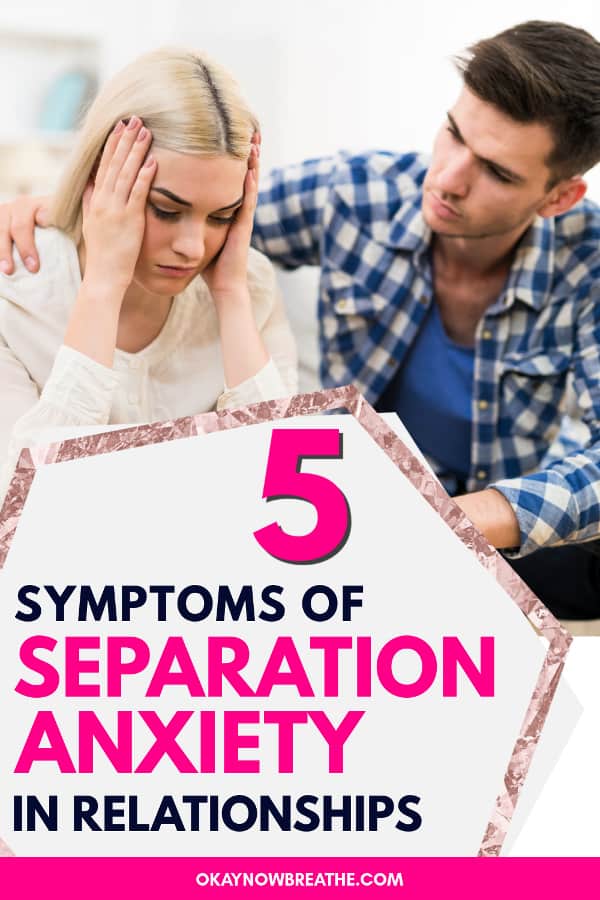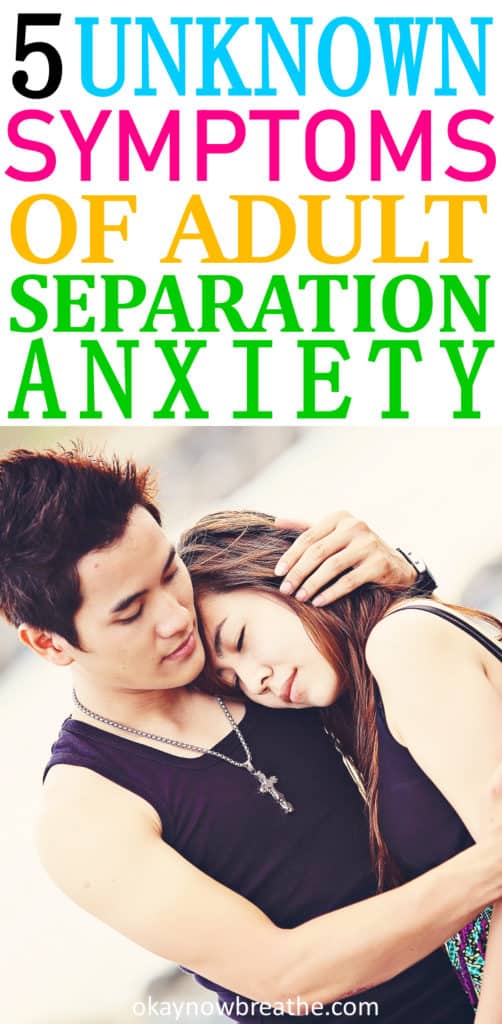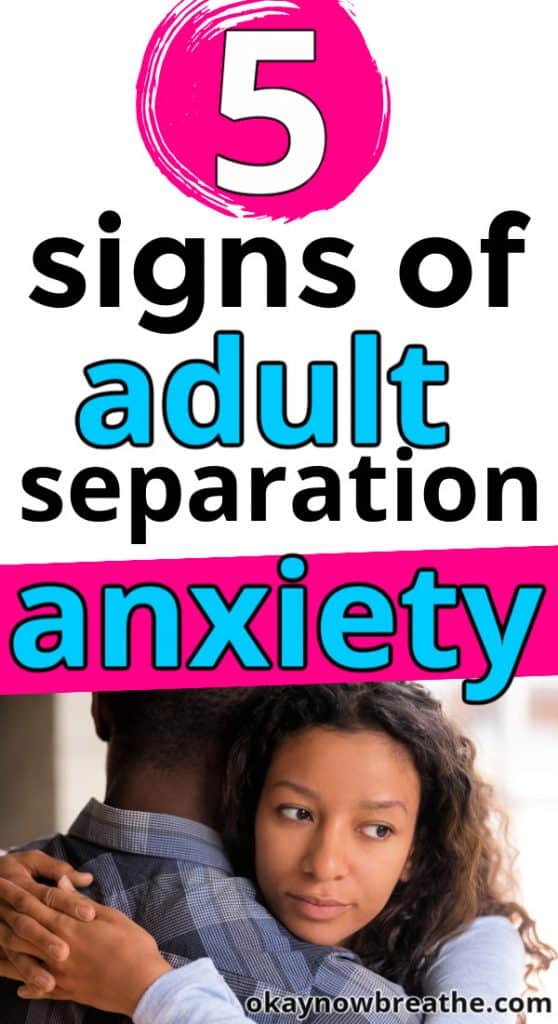
DISCLOSURE: I am not a mental health professional. If you need help finding a mental health care provider, call 1-800-662-HELP (4357) or visit Online Therapy to call, message, or video chat a certified therapist online. This post contains affiliate links. As an Amazon Associate, I earn from qualifying purchases. I may also receive compensation from Online Therapy or other sources if you purchase products or services through the links provided on this page. You can read my full disclaimer.
Symptoms of Adult Separation Anxiety
Nobody wants to admit that they struggle with adult separation anxiety.
There’s a sense of shame when it comes to codependency, and nobody wants to admit that they have dependency challenges.
Nobody wants to admit that they are so dependent on one person and without them being there, they completely shatter.
The more I’ve recovered from my adult separation anxiety, the more I realize how much it affected nearly every area of my life.
It took over my entire mind and body, and nothing was off-limits.
For five symptoms of separation anxiety in adults, keep reading.
To see how I’ve recovered: My Life with Separation Anxiety and How I’m Recovering
1. EXTREME DREAD
Separation anxiety causes extreme dread the moment someone living with it finds out the person they’re emotionally attached to has to leave.
The second they hear the news, they get a knot in their stomach, dizziness through their brain, and a heart that won’t stop breaking.
I’ve cried and broken down countless times because of the separation anxiety I’ve had from my boyfriend (now fiance).
I would wake up next to him and still dread the minute he had to go to work, even if it was eight hours later.
Heck, there was a time I would know he was leaving a year from now, and I dreaded every single moment leading up to it.
The fact of the matter is separation anxiety is completely terrifying.
All-encompassing.
It’s completely debilitating, and it’s not something to be taken lightly.
2. EXTREME JEALOUSY
Obviously, you can’t be with someone every single second of every day.
Not only is it not possible, it’s not healthy.
Everyone needs time for themselves.
People with separation anxiety understand this, but it’s still impossibly hard to accept.
They easily get jealous when their attachment spends time with other people, such as friends or even family members.
They can even feel jealous when their attachment spends time doing activities without them, such as watching a movie.
Don’t get it twisted. People with adult separation anxiety are not purposely being needy.
They didn’t choose to be like this.
This workbook really helped shift my mindset around and send me down the path of recovery.
3. ANGER
As with basically every other type of anxiety, anger likes to show its ugly face.
A lot of the time, our initial reaction is anger.
Because let’s face it…
It’s really hard to control your emotions when you feel under immense stress.
Common separation thoughts:
- Why would you do this to me?
- Why did you choose them over me?
- How come you don’t love me enough?
- Why couldn’t you have just stayed with me?
Because of this, people with separation anxiety aren’t surprised when they get into an argument or two with their person.
They’re also not surprised when the person they’re attached to starts the argument.
Either way, it hurts tremendously.
Learning to communicate can save the relationship between both people.
Giving the adult with separation anxiety advance notice usually helps them cope better, versus when they’re blindsided at a moment’s notice.
Also, communicating throughout the temporary separation can do wonders for the anxiety.
More on anxiety and anger:
4. SELF-HARM URGES
Self-harm urges are a common thing with people with separation anxiety.
(This can also be a symptom of borderline personality disorder. Please talk to a licensed mental health professional.)
Back when my separation anxiety was at its highest, I would pace my room when my fiance spent time with other people.
I would cry hysterically on the floor and shake.
I felt like he abandoned me and didn’t love me anymore.
I understand that these thoughts seem irrational.
But when you’re in the moment of intense separation anxiety, it’s beyond challenging trying to cope when the person you need the most isn’t there.
I felt like my entire world fell apart in an instant, and I would often turn to the thing that seemed to help me the most, which was harming myself.
…Which is just about one of the most unhealthy “coping mechanisms” there is.
Related post on self-harm:
5. SUICIDAL THOUGHTS
Separation anxiety in adults rarely infects lives by itself.
It’s very common that adult separation anxiety co-occurs with other mental illnesses, such as borderline personality disorder, depression, and PTSD.
This makes coping with separation anxiety that much more difficult.
For instance, depression can insidiously feed off separation anxiety.
When you’re feeling alone from your partner, your depression can make you feel utterly hopeless.
And when nothing else seems to make the pain stop, thoughts of suicide often enter the brain.
Please remember that suicide is a permanent fix for a temporary problem.
If you are suicidal, please get the help you deserve. We need you here.
Adult Separation Anxiety
Adult separation anxiety can manifest in a multitude of ways, such as dread, jealousy, anger, self-harm urges, and suicidal thoughts.
It also usually co-occurs with other mental illnesses, which can make recovery exhausting.
However, there is help.
Please talk to a therapist if you’re struggling with separation anxiety symptoms.
Related posts on separation anxiety:
- My Life with Separation Anxiety From My Boyfriend and How I am Recovering
- 5 Ways to Distract Yourself From Your Adult Separation Anxiety
- 4 Coping Mechanisms That Help Me Fight My Relationship OCD
Did you know that there is affordable online therapy?
Online Therapy is a complete online therapy toolbox.
Your therapy toolbox includes:
- Live video, voice, or text chat session with your therapist
- 8 easy-to-follow sections, including 25 worksheets
- Activity plan, journal, and tests
- Yoga and meditation videos
What I love about Online Therapy is that there are several life-changing options and therapists available, and you don’t even have to leave the comfort of your home.
This means you never need to worry before getting help.
Get 20% off your first month with my exclusive link.



